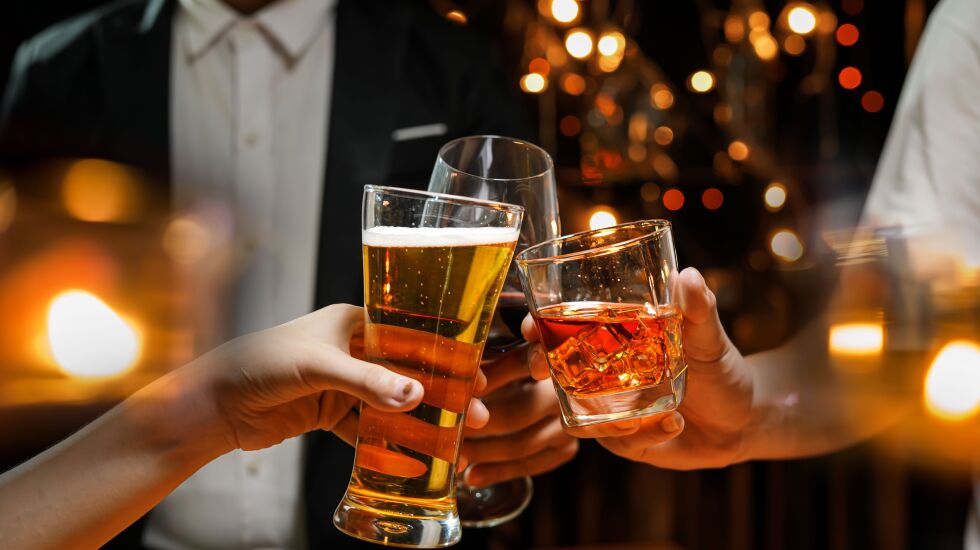
The holiday season brings a lot of joy but also, for some, an unhealthy temptation to drink — a lot.
While some people drink to celebrate, others drink because it helps them feel less depressed, less alone, or less bored, said Thomas Britton, chief executive officer of American Addiction Centers.
Holidays, Britton said, also can lead to increases in stress, isolation, and depression, causing more alcohol poisonings, binge drinking, car accidents and other adverse effects of large amounts of drinking.
Britton and other experts say there are healthy ways to handle these stressors during the holiday season, including inviting a buddy to celebrate with you and having an exit strategy in case things get too tempting.
George Koob, director of the National Institute on Alcohol Abuse and Alcoholism, recommends people familiarize themselves with standard drinks. Typically, a standard drink is 12 ounces of beer with 5% alcohol, five ounces of wine with 12% alcohol, or 1½ ounces of a distilled beverage.
Koob said government guidelines recommend no more than two alcoholic drinks a day for men and one a day for women.
Drinking is the leading cause of substance abuse in the United States, according to Britton, who said one-sixth of the population binge drinks and about 25% of binge drinkers do it weekly.
The Centers for Disease Control and Prevention defines binge drinking as consuming five or more drinks on an occasion for men or four or more drinks on an occasion for women. Heavy drinking equals eight or more drinks a week for women and 15 or more per week for men, the CDC says.
Binge drinking is associated with an increased risk of alcohol use disorder, the CDC says.
“There’s significant medical risk and safety risks to binge drinking,” Britton said. “Holiday times, both in parties or in isolation, can trigger that ... And one thing we know is that ,during the pandemic, isolation has been a massive, massive issue for people.”
One of the biggest factors leading to excessive drinking is a negative emotional state, Koob said. While holidays can be fun, being around family members and certain environments can trigger negative emotions.
The most important thing a person can do if they want to stop drinking alcohol is reach out for help or treatment, Britton said. The second thing they can do is plan where they’ll spend the holidays.
If there’s a New Year’s Eve party where friends plan to drink tons of alcohol, it’s probably not the best choice, Britton said.
“I can either ask my family not to drink and see if they would honor that, or I can choose to go somewhere with other people that are trying not to drink,” he said.
It also helps to take a friend or someone else who is in recovery.
You can also take a walk or leave the event, Koob said. And while people shouldn’t need an excuse to leave, they can say they’re not feeling well.
“You have to have an escape plan,” he said.
Experts say there are ways to help loved ones who don’t drink, like having non-alcoholic drink options.
“The average person doesn’t have a problem with alcohol, so the average person won’t really miss having alcohol,” Britton said.
It never hurts to ask loved ones how to support them, he said, asking those who struggle with drinking things like how you can support them.
“As a culture, we’re often less comfortable in asking difficult questions,” he said. “If you love somebody, you share your concern for them.”
There are also things to avoid when celebrating with people who don’t drink alcohol, Koob said.
Don’t push, he said, and steer clear of saying things like, “How come you’re not having a drink?” or “Join us!”
And it’s OK to keep an eye on them and be “socially acute,” Koob said.
“You don’t want to leave them in the corner by themselves where everybody else is toasting,” he said. “They should be included in the celebration, but they don’t have to drink.”
Read more at usatoday.com







